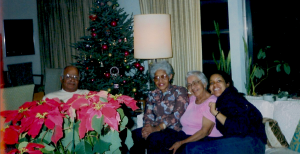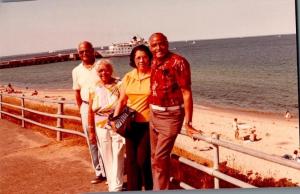Business Man & Cooperator Joseph L Pierce Branded A Subversive For His 20th Century Civil Rights Fight
All but forgotten - Rediscovered archives seems to suggest Joseph L Pierce is historically blackballed.
MONROVIA, MD, UNITED STATES, July 7, 2022 /EINPresswire.com/ -- How did a man who was a fierce advocate for business, in particular Black business, civil rights and education be forgotten by the establishment? The only reference to him before my research was conducted by prominent DC Real Estate Broker, Norris Dodson. As it happens, Mr. Dodson, as I called him, is cousin to John Pinkett, the founder of the first Black Owned Insurance firm in the United States. John Pinkett Insurance made Uncle Joe a partner. Mr. Dodson was and is a fierce advocate for the preservation of the U Street/Shaw area's Black History.
Uncle Joe worked to not only improve the lives of the Black community, he also worked to elevate this idea of the Black elite, if you will, while challenging oppressive constructs. I understand Uncle Joe on a personal and intellectual level based on my proximity to him growing up.
Uncle Joe was one of the early African American graduates of the Wharton School at PENN in the 1920’s. PENN is a Quaker Ivy institution and it seems the university’s tenets ran deep within him. According to a Forbs article written in 2009, Quakers believe in:
Quakers banded together for self-protection, forming communities and networks based on mutual trust. Supported by those communities and empowered by those networks, Quakers invented new ways of doing business.
Perhaps Uncle Joe adopted those beliefs as an African American living in the early to mid-20th century. Perhaps he also found them practical, simple and principled and closely related to his Episcopal faith. He could have also found them Transcendental as both he and his wife Delilah believed in simplicity, humility, and hard work. This is easily supported by his love of Thoreau. He rarely watched TV and read obsessively. He also quizzed his family about current events, US history, and politics. Uncle Joe explored his Scottish roots and traveled to the United Kingdom and brought back his Pierce family crest. He didn’t believe in using “slang” and would correct us all if we spoke incorrectly. He believed it made us look uneducated. He loved Martha’s Vineyard Island as much as Washington, DC and the Black economic engine that existed. As a 5 generation Vineyard family, I can remember eating out, dressed for dinner, and using proper table manners. Uncle Joe would give you the stare if you placed your elbows on the table.
It was a complex time in American history and for that reason I can see he both loved capitalism and questioned those guardians of capitalism who deliberately excluded groups of people based on their opinions of undesirable traits. A great example was his involvement in the co-operative business community in Washington, DC. Co-operatives core tenants are centered around its 7 principles and including business owners representative of the entire community.
Uncle Joe was the Board Chair of the Washington, DC Co-operative Book Shop that closed in 1950. The DC Co-operative Book Shop formed as a cooperative in 1938 and was famous for speakers like First Lady Eleanor Roosevelt and for being accused of being subversive for selling “Communist propaganda”. In the early to mid-20th century the Communist Party was active and some African Americans were interested in their views on topics pertaining to “civil rights” and “equality” but turned off by their views on Russia. In the Testimony of Walter S. Steele regarding Communist activities in the United States. Hearings before the Committee on Un-American Activities, July 21, 1947:
"I wish to again refer to the Washington, D. C, Cooperative Bookshop, which if not directly affiliated with the Communist book shops, is doing party chores. Chairman of the board of trustees of this bookshop is Joseph L. Pierce."
Like many African Americans at the time, the fight for Civil Rights created “strange bedfellows”. It was well known groups like the National Association for the Advancement of Colored People (NAACP) and labor unions were considered Communist. The letter I rediscovered in the Daily Worker, a New York Based publication, shows Uncle Joe signed his name to a letter in 1940 with other key figures of the time. The Letter entitled: Negro Leaders Protest Attacks Against Communist Candidates was signed by Paul Robeson (Singer/Actor), Richard Wright (Novelist), and Arthur Huff Fauset (Historian). Many of the letter signers went on to be included in the American Canon. Why don’t you see Joseph L. Pierce’s name mentioned in the modern dialogue? Why is he not included in the African American Museum? He also was a co-operator!
Uncle Joe taught me that being a man of principle is important above all - As long as you are building wealth and gaining access to educational opportunities. Why it seems he was excluded from the American Canon, in particular the Black Canon, is beyond my comprehension? He was a successful business man and job creator and instrumental in helping to build an economic engine in America. He should be mentioned in the same vein as, for example, W.E. B. Dubois and Charles Clinton Spaulding. The Afro American wrote about Uncle Joe in a feature article entitled: We Are Proud of This Man in 1964. Dorothy B. Porter included him in The Negro in the United States.
I'm not sure why he was cast aside but I encourage the world to help rediscover his legacy.
Stephen McDow
McDow International Enterprises
+1 202-909-2934
email us here
Visit us on social media:
Facebook
Twitter
LinkedIn


